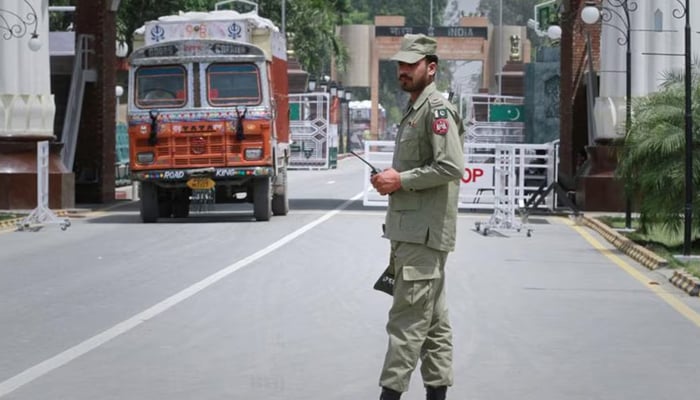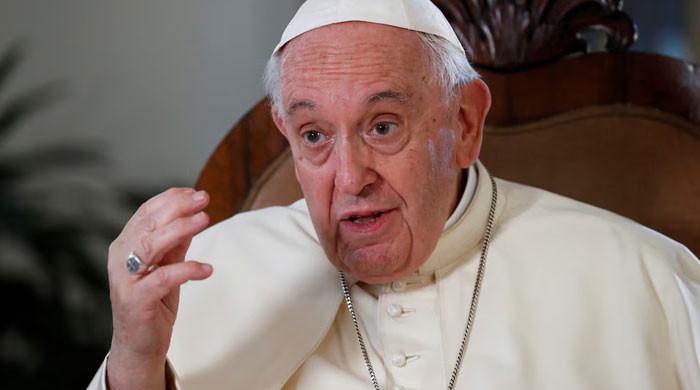UN urges Pakistan, India to have 'maximum restraint' after IIOJK attack
"Any issues between Pakistan and India should be resolved peacefully," says United Nations
April 25, 2025

- UN urges both countries to ensure situation doesn't deteriorate.
- Islamabad closes border, cancels visas, and warns of war.
- IIOJK tourists attacked, 26 men killed brutally on Tuesday.
The United Nations (UN) urged Pakistan and India to show "maximum restraint" as the nuclear-armed rivals imposed tit-for-tat diplomatic measures over a deadly shooting in Indian Illegally Occupied Jammu and Kashmir (IIOJK).
Relations have plunged to their lowest level in years, with India accusing Pakistan of supporting "cross-border terrorism" after gunmen carried out the worst attack on civilians in contested Muslim-majority IIOJK for a quarter of a century.
"We very much appeal to both the governments [...] to exercise maximum restraint, and to ensure that the situation and the developments we've seen do not deteriorate any further," UN spokesman Stephane Dujarric told reporters in New York on Thursday.
"Any issues between Pakistan and India, we believe, can be and should be resolved peacefully through meaningful mutual engagement".
Indian Prime Minister Narendra Modi on Thursday vowed to hunt down the gunmen responsible for killing 26 men at the popular tourist site of Pahalgam.
"I say to the whole world: India will identify, track and punish every terrorist and their backer," Modi said, in his first speech since Tuesday's attack in the Himalayan region.
"We will pursue them to the ends of the Earth."
Denying any involvement, Islamabad called attempts to link Pakistan to the Pahalgam attack "frivolous" and vowed to respond to any Indian action.
"Any threat to Pakistan's sovereignty and to the security of its people will be met with firm reciprocal measures in all domains," a statement from the PM's Office said, after Prime Minister Shehbaz Sharif chaired the high-level National Security Committee meeting with top military chiefs.
Kashmir has been divided between India and Pakistan since its independence in 1947. India still has not fulfilled its promise of holding a UN-mandated plebiscite.
Rebel groups have waged an insurgency in IIOJK since 1989, demanding independence. India's air force and navy both carried out military exercises on Thursday.
Indian police offered a two million rupee ($23,500) bounty for information leading to each man's arrest.
A day after the attack, New Delhi suspended a water-sharing treaty, announced the closure of the main land border crossing with Pakistan, downgraded diplomatic ties, and withdrew visas for Pakistanis.
In response, Islamabad ordered the expulsion of Indian diplomats and military advisers, cancelling visas for Indian nationals, with the exception of Sikh pilgrims — and closing the main border crossing from its side.
Pakistan also warned any attempt by India to stop the supply of water from the Indus River would be an "act of war".
'Reduce it to dust'
Pahalgam marks a dramatic shift in recent Kashmiri rebel attacks, which typically target Indian security forces.
Experts say that a military response may still be in the pipeline, with some speculating that it may come within days, while others say weeks.
In 2019, a suicide attack killed 41 Indian troops in IIOJK and triggered Indian air strikes inside Pakistan, bringing the countries to the brink of all-out war.
"Whatever little land these terrorists have, it's time to reduce it to dust," Modi said on Thursday, after holding two minutes of silence in memory of those killed, all but one of whom was Indian.
Tuesday's assault occurred as tourists enjoyed tranquil mountain views at the popular site at Pahalgam, when gunmen burst out of the forests and raked crowds with automatic weapons.
Indian security forces have launched a vast manhunt for the attackers, with large numbers of people detained.
The attack has enraged Hindu nationalist groups, and students from Kashmir at institutions across India have reported experiencing harassment and intimidation.











